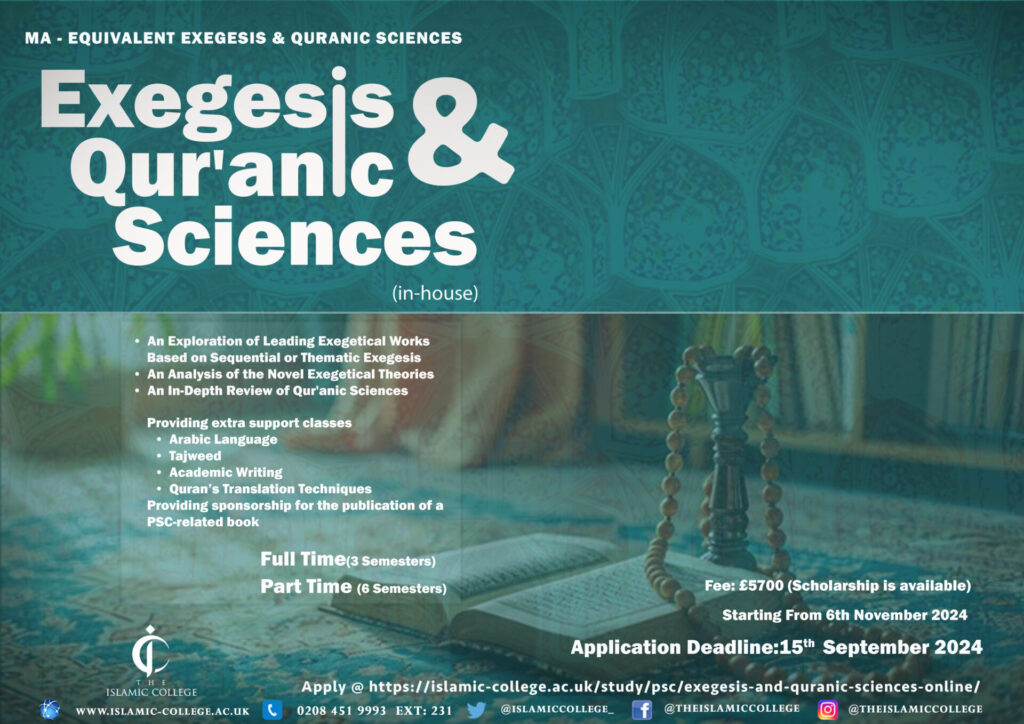
MA-Equivalent Exegesis & Quranic Sciences (In house)
Mature students, with appropriate backgrounds, are also welcome to the course.
(Number of Semesters)
In-house
£5700 (scholarships are available)
Scholarship and study grants are available subject to conditions.
Please contact the College for more details.
2024-2025
15th September 2024
ps*@is*************.uk
0044 (0) 2084519993 (Ext. 231)
In this Programme, students will engage in an in-depth study of the Qur’an, the Muslims’ divine scripture, utilising different exegetical methods.
Qur’anic exegesis provides the knowledge and tools to understand the meaning of each word and phrase and become familiar with the underlying meaning of the text. In this programme, the students will become well-versed in the principles of exegesis and Qur’anic sciences. They will engage in their own independent research by reading the Qur’an and consulting major exegetical works while using sequential or thematic methods and employing different theological, philosophical, mystical, narrative and jurisprudential approaches of different Islamic intellectual traditions, especially that of Shi’i school.
The students will become familiar with both the external and internal hermeneutic principles governing the understanding of the text. They will learn different exegetical methods, including Qur’an-by-Qur’an, narration-based, reason/intellect-based, and mystical methods. The programme will also delve into the views of leading orientalists regarding the Qur’an, its compilation and qira’āt.
Equivalent Programmes are designed to provide all those who are interested in acquiring in-depth knowledge about the most important aspects of Quranic Studies, regardless of their previous academic background. Students who successfully complete the Islamic College’s equivalent Programmes can apply for higher degrees at other universities.
In this programme, students will engage in an in-depth study of the Qur’an, the Muslims’ divine scripture, utilising different exegetical methods.
Qur’anic exegesis provides the knowledge and tool to understand the meaning of each word and phrases and become familiar with the underlying meaning of the text. In this programme, the students will become well-versed with the principles of exegesis and Qur’anic sciences. They will engage in their own independent research through reading the Qur’an and consulting major exegetical works, while using sequential or thematic methods and employing different theological, philosophical, mystical, narrative and jurisprudential approaches of different Islamic intellectual tradition, especially that of Shi’i school.
The students will become familiar with both the external and internal hermeneutic principles governing the understanding of the text. They will learn different exegetical methods including Qur’an-by-Qur’an, narration-based, reason/intellect-based, or mystical methods. The programme will also delve into the views of leading orientalists regarding the Qur’an, its compilation and qira’āt.
| Subject Specific Intellectual |
| Upon successful completion of this Programme, the students are expected to have acquired:
1. An In-Depth Analytical and Comparative Understanding of Key Exegetical Works and Qur’anic Sciences 2. A Thorough Understanding of Exegetical Methods, Approaches and Schools. 3. A Profound Knowledge of Exegetical Principles and Terminology 4. A Deep Familiarity with the Viewpoints of the Orientalists about the Qur’an and Exegesis 5. An Ability to Engage in Research on the Qur’anic Perspectives on Specific Themes Such as God, Man and Creation, Prophethood, Revelation, Imamate and Eschatology.
|
| Subject Specific skills |
| Students will have:
1- An advanced use of libraries and other learning resources effectively and systematically 2- The ability to communicate exegetical ideas in writing, debate and oral or visual presentations, with clarity, precision, and incisiveness, in expository, narrative, analytical, and argumentative modes. 3- The ability to summarise key points from presented material. 4- The ability to read original exegetical resources independently. 5- The ability to articulate and evaluate the specific themes underlying a more general question. |
| Modules (Compulsory & Designated) | ||
| Compulsory Modules & Dissertation | Credit | Code |
|
Students should do the following 140 credits. | ||
| 1. Sequential Exegesis (Interpretation) (1) | 20 | EQS001 |
| 2. Thematic Exegesis (Interpretation) (1) | 15 | EQS003 |
| 3. Quranic Sciences (1) | 15 | EQS005 |
| 4. Principles of Quranic Exegesis | 15 | EQS007 |
| 5. Exegetical approaches | 15 | EQS008 |
| 6. Dissertation | 60 | EQS012 |
| Designated Modules | Credit | Code |
|
Students should choose four of the following modules (totalling 40 credits). | ||
| 1- Sequential Exegesis (Interpretation)(2) | 10 | EQS002 |
| 2- Thematic Exegesis (Interpretation) (2) | 10 | EQS004 |
| 3- Major Exegetical works (and their Authors | 10 | EQS009 |
| 4- The Holy Quran and the Orientalists | 10 | EQS010 |
| 5- Quranic sciences(2) | 10 | EQS006 |
| 6- Research Methodology | 10 | EQS011 |
| Learning, teaching, and assessment methods |
| The students will be taught and assessed based on the following:
· Lectures and Seminars · Tutorials · Class Discussion and Student Presentations · Independent Reading · Essay Writing · Dissertation |
Students who are returning to higher education after some years, or those whose first language is not English, or need to have a background in Arabic, are especially encouraged to contact the Department for Open Courses at The Islamic College. The Islamic College provides support lessons for those who want to learn Arabic or Farsi or need to improve their academic English.
Students from different educational backgrounds are offered the opportunity to take modules from other relevant programmes of The Islamic College free of charge to assist them in their Postgraduate studies.
The College is housed in a listed building, which has been converted to a high standard to cater for the needs of students. We provide a calm and peaceful atmosphere, highly conducive to study and reflection. Our facilities:
- Common rooms
- Classrooms furnished with up-to-date pieces of educational equipment
- Library
- Computer lab providing students access to online learning resources
Digital resources and software D2L (Brightspace)
BOOK CATEGORIES
New Release
- Classical Texts
Shi‘i Theology (Kashf al-Murad fi Sharh Tajrid al-I‘tiqad)
£25.00 Add to basketRated 0 out of 5


